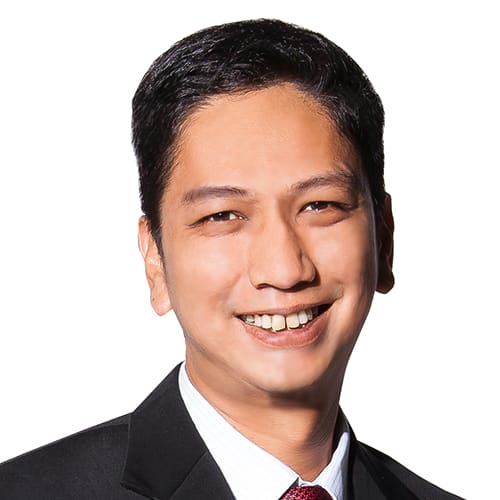Indonesia Elections 2024: More celebrities are vying to be Members of Parliament. What’s the driving force?
With a campaign period of only 75 days, political parties are relying on celebrity-turned-politicians to woo voters to the ballot box.
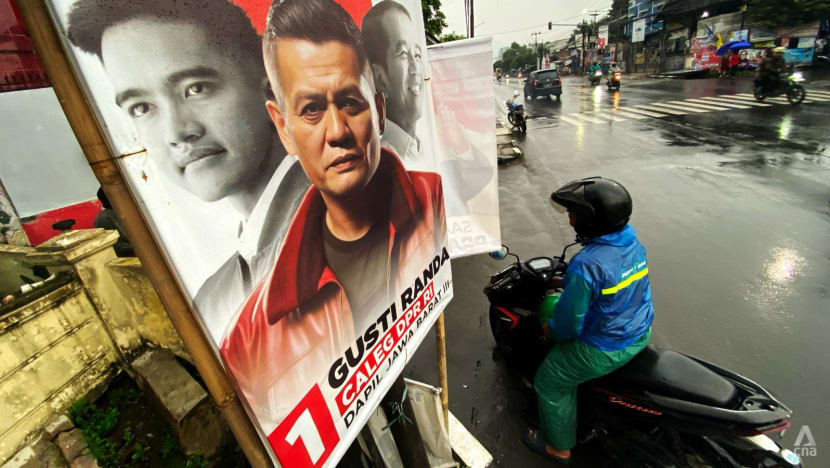
A banner in Bogor, Indonesia, showing 90s television star Gusti Randa running for parliament in the country's upcoming elections on Feb 14, 2024. (Photo: CNA/Wisnu Agung Prasetyo)

This audio is generated by an AI tool.
JAKARTA: They may no longer grace the silver screen, their songs no longer dominate the airwaves, but on Wednesday (Feb 14), the faces of dozens of Indonesian movie stars, television hosts, comedians and musicians will be featured on millions of ballot papers across the country as Southeast Asia’s largest economy stage its parliamentary elections.
For months, the streets of Indonesia have been inundated with campaign posters and banners belonging to the likes of 90s television star Gusti Randa, singer-songwriter Melly Goeslaw and talk show host Uya Kuya, who will all be competing for a seat at the national parliament on the Valentine’s Day election.
They are joined by 14 Indonesian celebrities who made the career switch to politics prior to this upcoming election and are now campaigning to get re-elected as members of parliament (MPs). Among them are comedian Eko Patrio, movie star Desy Ratnasari and music veteran Kris Dayanti.
With widespread name recognition, celebrities appear to have a clear advantage during elections over career politicians.
During the 2019 parliamentary election, at least 54 actors, television personalities and musicians ran for parliament. The number does not include celebrities who ran for governors, regents, mayors or their deputies.
This year, there are at least 82 people in the entertainment industry running as MP candidates. Indonesia will stage its regional elections to elect governors, regents and mayors in November and nominees for these elections have not been announced.
With the number of celebrities running for public office appearing to be on the rise in Indonesia, analysts are worried political parties are becoming increasingly in favour of nominating a celebrity as an MP candidate, leaving their less famous cadres with little chance to shine and rise among the party’s ranks.
Experts are also worried about how these celebrity politicians will fare if they are elected and assume public office.
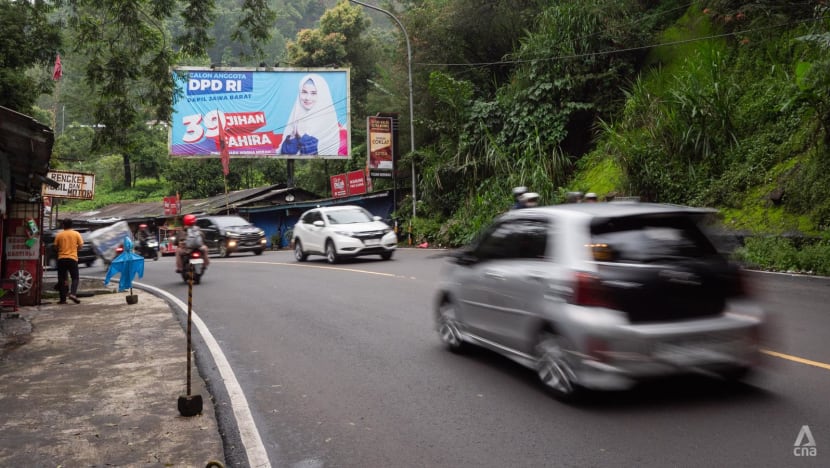
“We have seen time and time again that some of these celebrity politicians do not take their new responsibilities seriously,” Mdm Khoirunnisa Nur Agustyati, executive director of the non-profit Association for Elections and Democracy (Perludem) told CNA.
“Some of them still perform shows or appear in commercials. How can we expect them to deliberate bills or discuss complex issues affecting millions of lives?”
SHORT CAMPAIGN PERIOD TO BLAME: ANALYSTS
More than 200 million Indonesians will hit the ballot booths on Valentine’s Day as the world’s third-biggest democracy is set to not only pick its next president but also decide on members of its national, regional and city-level parliaments.
In total, more than 20,000 positions are up for grabs and these positions are being vied by around 300,000 candidates from 18 different political parties.
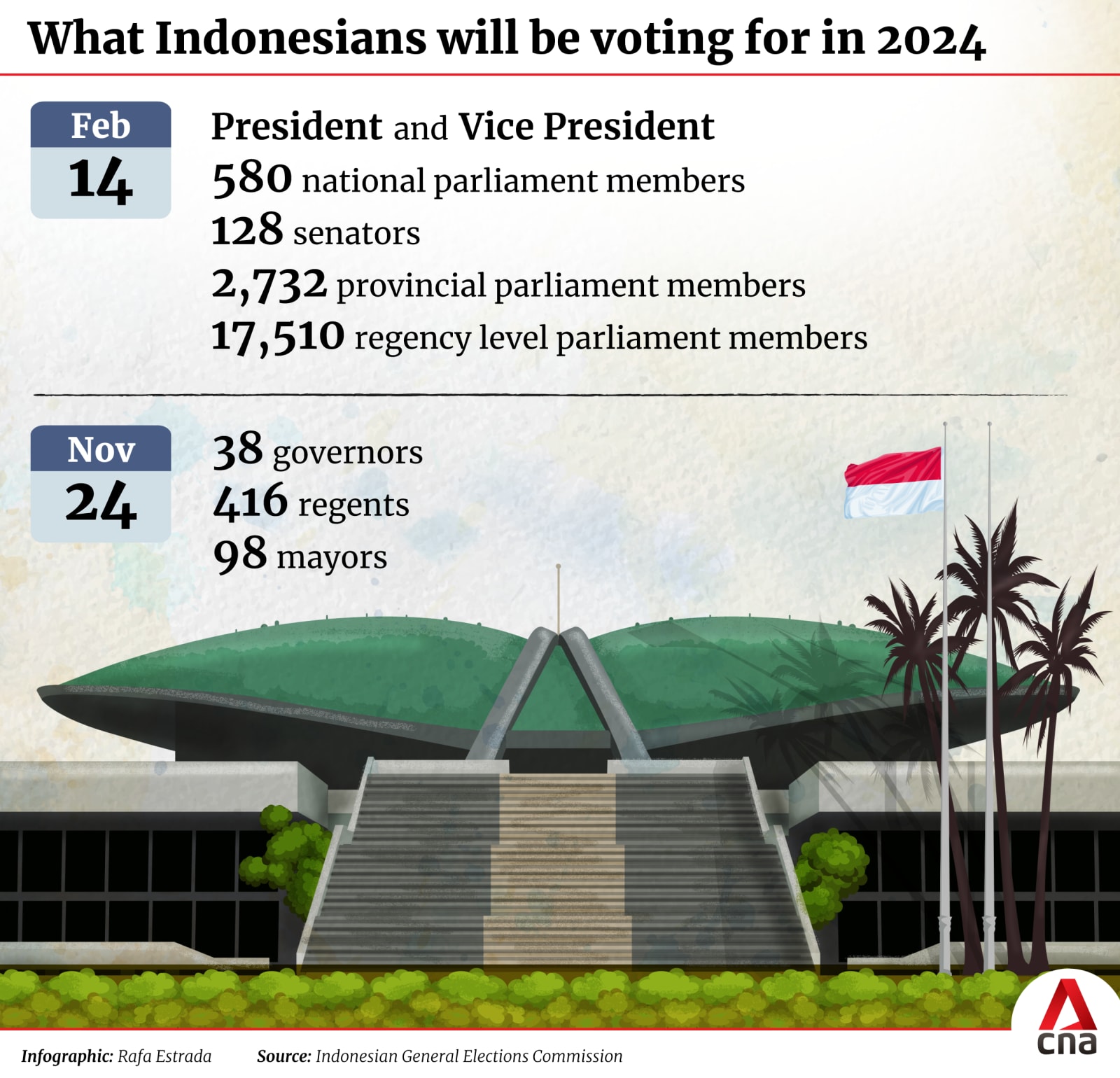
One major factor why the number of celebrities running for MP increased this year is the short campaign window.
During the 2019 election, presidential and parliamentary candidates had 203 days between Sep 23, 2018 and Apr 13, 2019 to campaign. This time, candidates only have 75 days between Nov 28, 2023 and Feb 10, 2024.
The decision to shorten the campaign period was made by the Indonesian parliament during a hearing with the country’s General Election Commission in 2022. Several MPs at the time argued that shortening the campaign period would save costs, particularly as Indonesia’s economy was still reeling from the COVID-19 pandemic.
Mdm Titi Anggraeni, an election law expert from University of Indonesia said the short campaign period provides little time for voters to get to know their legislative candidates, especially those who are running for the first time.
“Thus (the short period) benefits incumbent MPs who already made a name for themselves, celebrities and those who came from famous families,” she told CNA.
Beyond the celebrities, among the list of famous names competing for a seat in parliament are children, spouses and siblings of Indonesia’s political elites.
The list includes Mdm Puan Maharani, the current speaker of the Indonesian parliament. Mdm Puan is the daughter of Mdm Megawati Sukarnoputri - Indonesia’s fifth president and chairwoman of Indonesia’s biggest political party, the Indonesian Democratic Party of Struggle (PDI-P).
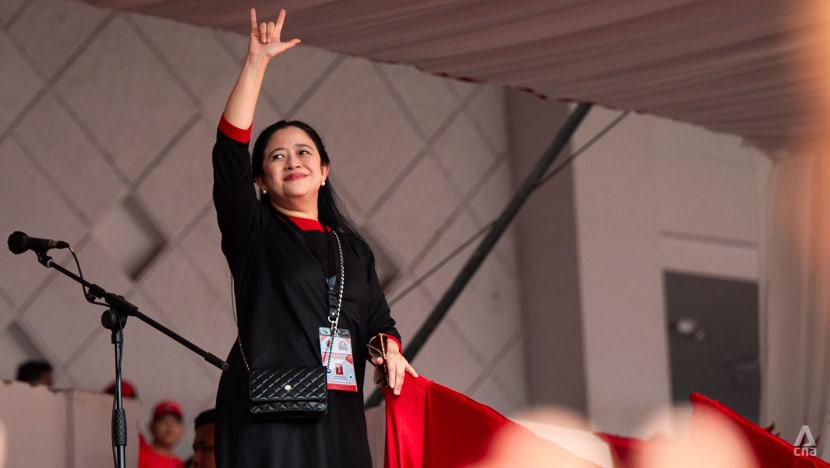
Mdm Megawati herself is the daughter of Indonesia’s first president Sukarno.
Also campaigning to get re-elected as MP is Mr Edhie Baskoro Yudhoyono, the son of former president Mr Susilo Bambang Yudhoyono and younger brother of Democratic Party chairman Mr Agus Harimurti Yudhoyono.
Meanwhile, the son of outgoing president Joko Widodo, Mr Gibran Rakabuming Raka, is running for vice-president alongside defence minister Mr Prabowo Subianto.
Mr Prabowo, the chairman of Indonesia’s second biggest party, Gerindra, has a niece, Mdm Rahayu Saraswati Djojohadikusumo, who is also running to get re-elected as MP.
“Our election is already complicated, the short campaign window means those who are in the media a lot will likely get the vote. For many voters, rather than choosing someone they don’t know, why not choose someone they do know,” Mdm Titi said.
OPAQUE NOMINATION PROCESS
Celebrities running for public office are not unique to Indonesia.
The United States, for example, was once led by former actor Ronald Reagan as well as property mogul and reality TV star Donald Trump.
Several US states also were once led by celebrities. Movie star Arnold Schwarzenegger led California for two consecutive terms between 2003 and 2011 while former wrestler Jesse Ventura served as governor of Minnesota from 1999 to 2003.
But unlike the United States, political parties in Indonesia do not have primary elections, where celebrities are pitted against their non-celebrity rivals in a bid to receive an official party nomination.
“(A party’s) nomination process in Indonesia is not transparent,” Mdm Siti Zuhro, a political expert from the Indonesian National Research and Innovation Agency (BRIN), told CNA.
“A newcomer can easily get the nomination while a cadre who has been loyal to the party for years doesn't, just because the newcomer is a well-known celebrity. The recruitment, promotion and nomination processes inside a political party are not based on merit, not based on who has the brightest ideas or who will make a good MP.”
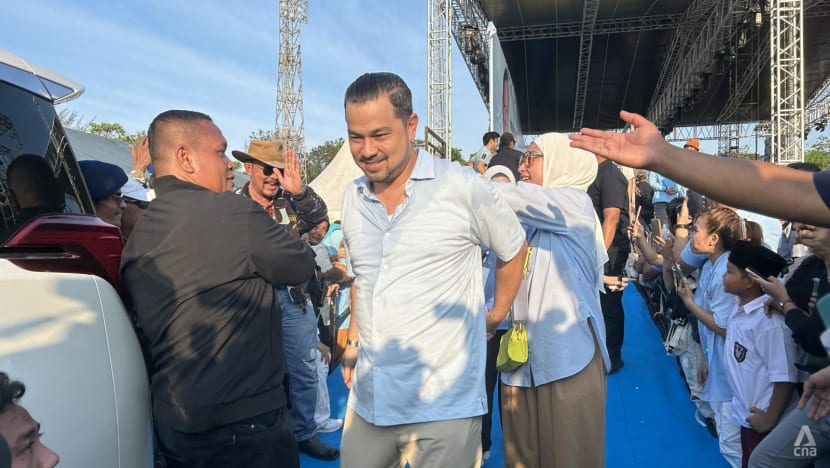
Mr Hadar Nafis Gumay, executive director of non-for-profit organisation Network for Democracy and Electoral Integrity (NETGRIT) echoed the sentiment.
“Parties must disclose to the public how and why a particular candidate is nominated because the nomination process for parliamentary candidates is not done at a party convention for everyone to see,” he told CNA.
Mr Willy Aditya, the executive chairman of the National Democratic Party (Nasdem) said that all of its candidates have gone through a rigorous vetting process.
"The public figures whom we nominate are those who have been in the party for a long time and slowly made their way up from the bottom," he told CNA.
Among the parliamentary candidates nominated by Nasdem are singer Anisa Bahar and television host Choky Sitohang. The former is running for the first time while the latter failed to secure enough votes in 2019 and is running for the second time.
Meanwhile, National Mandate Party (PAN) executive chairwoman, Mdm Zita Anjani said her party is treating all of its cadres equally and defended its celebrity nominees.
“PAN is opening its doors to everyone. Our MPs are quality MPs including the celebrities. That’s why our celebrity MPs get re-elected time and time again,” she said in an interview with online portal Rakyat Merdeka on Jan 18.
PAN is home to several celebrity MPs who are now running for re-election including comedian Eko Patrio, soap opera actor Primus Yustisio and movie star Desy Ratnasari.
RECOGNITION NOT A GUARANTEE FOR VOTES
But fame alone does not necessarily mean a candidate will secure enough votes and get elected into office.
In 2019, only 14 actors, comedians and musicians secured a seat in parliament.
Among those who failed were some of the biggest names in the Indonesian entertainment industry like Katon Bagaskara, the frontman of Indonesia’s legendary band Kla Project; Ahmad Dhani Prasetyo of another legendary band Dewa; and veteran comedian Dedi “Miing” Gumelar.
“Sometimes these celebrities are nominated just to draw more attention to their respective political parties so that the parties will get enough votes to qualify for a seat in parliament,” Mdm Khoirunnisa of Perludem said.
According to the 2017 Law on Election, a political party must secure four per cent of the votes nationally to secure their place at the national level parliament. In 2019, there were only eight political parties which passed this so-called “parliamentary threshold”.
The requirement does not apply to parties competing at the provincial, regency and city level parliaments.
While there were only a handful of celebrities who managed to secure a seat at the national parliament in 2019, the same cannot be said for those connected to the country’s political elites.
Non-for-profit group Indonesian Parliament Watch (Formappi) noted that there are at least 48 sitting MPs with familial ties to party leaders and senior government officials. The majority of these MPs, Formappi researcher Mr Lucius Karus said, are now seeking re-election.
"This is evidence that there is nepotism and political dynasties inside political parties. There is a problem with the internal democratic process inside political parties,” Mr Lucius told CNA.
Mdm Titi, the election law expert, said there is currently no regulation stipulating how a political party should nominate their candidates for public offices.
She suggested that a candidate should serve at least three years inside a party before they can run in an election, adding that there should also be a primary election that is open to the public to make sure that the candidate is vetted properly and done in a transparent manner.
“Voters are like customers in a restaurant. They can only choose what’s on the menu,” she said.
“It is the parties’ responsibility to come up with a good menu, to ensure that they only nominate the best candidates possible for people to choose from.”








